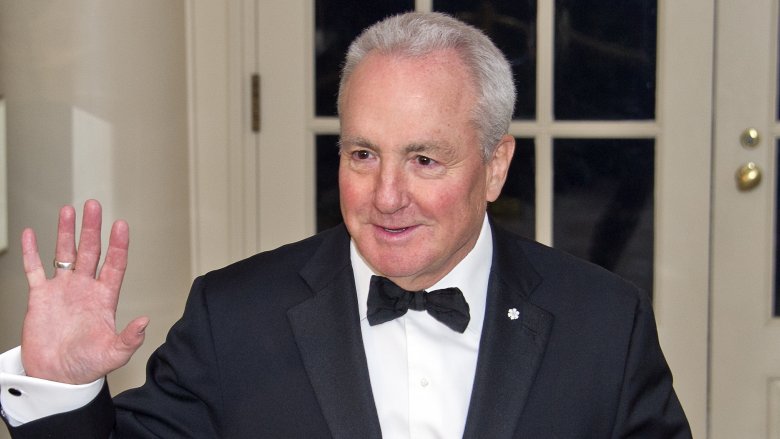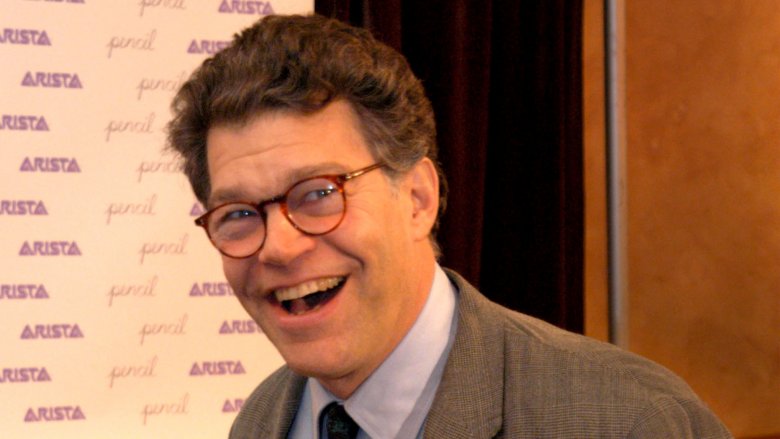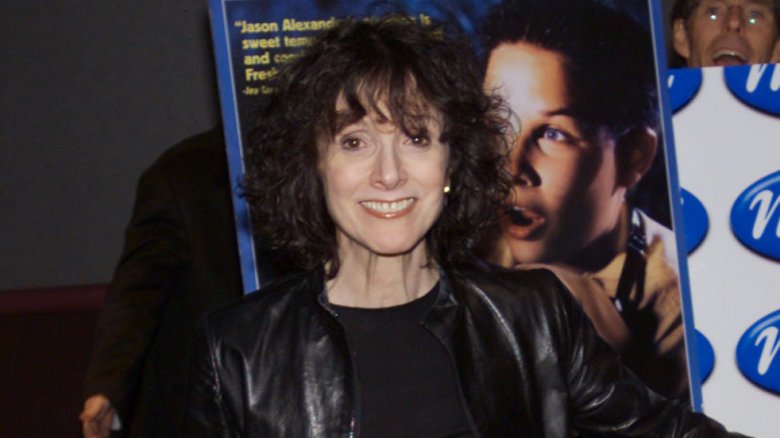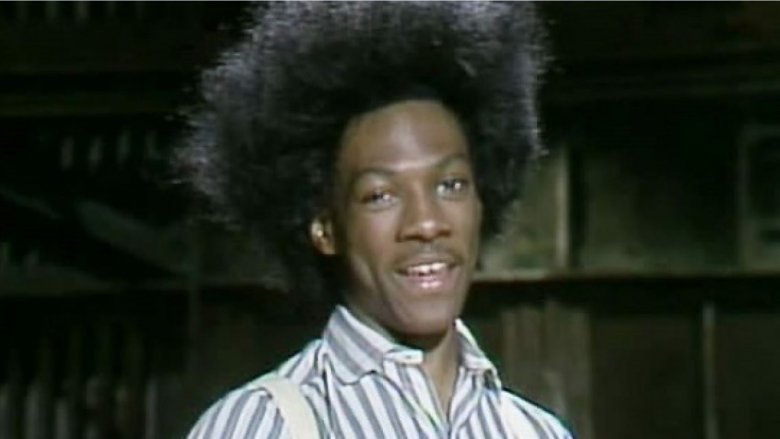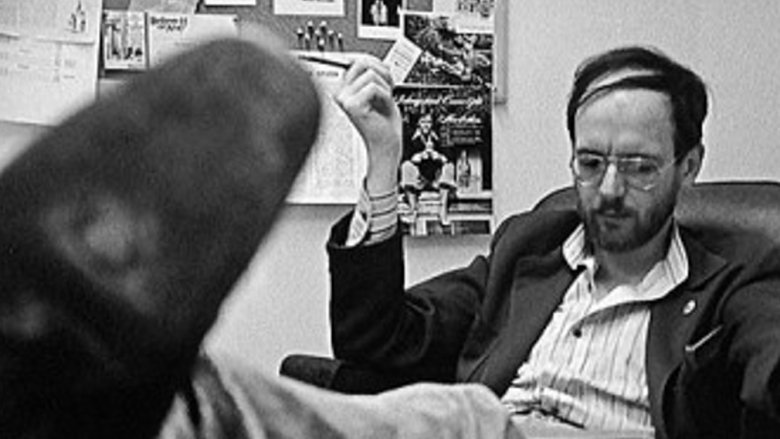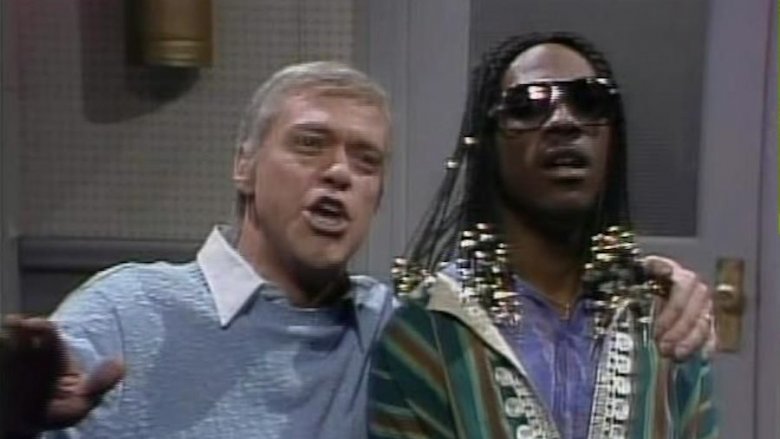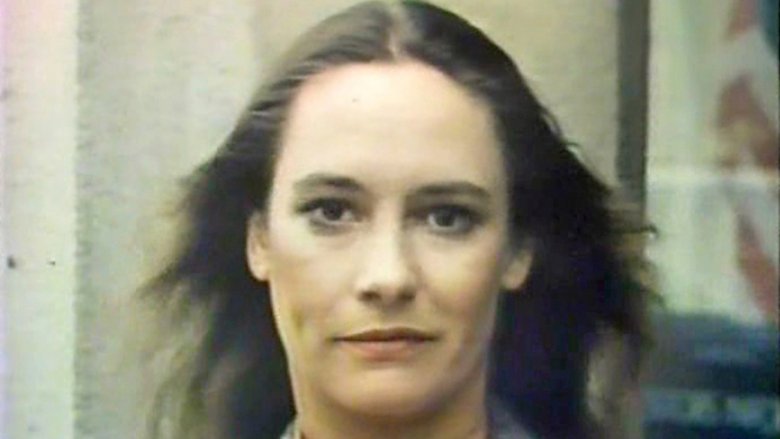The Untold Truth Of SNL's Forgotten Season
For more than 40 seasons, Saturday Night Live has been the premiere TV sketch comedy show, turning little-known actors into stars and speaking truth to power. For almost that entire time, SNL has been guided by the steady hand and impeccable comedic instincts of creator and producer Lorne Michaels.
Not the entire length of the show's run, however. Michaels parted with the show between 1980 and 1985 to pursue other movie and TV projects because he needed a break. The first year he was gone, the 1980-'81 sixth season of SNL, was what some might call a "transitional" or "building" period—a polite way of saying it was the most tumultuous year in the show's long history.
Lorne Michaels wanted a break, but ended up leaving the show
Making groundbreaking, zeitgeist-defining television is hard work—and after five years of putting together 90 minutes of it week in and week out, Lorne Michaels needed a break. As he said in Live from New York: The Complete, Uncensored History of Saturday Night Live, he wanted "the summer off, plus just a month or two of recovery time," thinking since NBC News usually used SNL's space for election night coverage that "after the 1980 election" would be a good time to premiere the sixth season, as opposed to the usual September start. But Michaels also admitted he wasn't sure if he wanted to come back at all, because to continue the show meant he'd have to "give up all thoughts of directing movies or whatever else I thought I might want to do with my life."
But in case he decided to leave for a little while—or longer—Michaels floated some ideas to NBC about who should take over in his absence. His top choice: SNL writing team (and occasional performers) Al Franken and Tom Davis. He figured they'd be the best candidates to maintain the quality, integrity, and tone of the show.
Al Franken could've taken over, but he upset the president of NBC
He was scheduled to meet with NBC president Fred Silverman in May 1980, but Michaels has claimed that Silverman "stayed out late the night before" and rescheduled the meeting for the following Monday in May 1980. Over the weekend, Al Franken appeared on "Weekend Update" and did a piece called "A Limo For a Lame-o."
In a spectacular case of bad timing, Franken's segment was a personal attack on Silverman. Franken said it wasn't fair that he should have to hail cabs in New York while Silverman, a "lame-o," got to take a limousine wherever he went, especially because NBC was failing in the ratings. He ended by asking viewers to send postcards to Silverman's office demanding that Franken get a limo. Michaels didn't think the piece was all that funny, but he left it in the show anyway. Bad idea—Silverman saw the episode as it aired, and according to Michaels, he flew "into a complete rage," thinking the bit was Michaels exacting revenge for the canceled meeting. That strained relations between show and network to such a degree that Michaels decided to walk away from SNL completely.
NBC picked an unlikely replacement for Lorne Michaels
Because the whole mess was caused by Al Franken, there was little chance that the writer/performer was going to get the plum gig of replacing Michaels. A few weeks after the spat, Michaels got a call from NBC executive Brandon Tartikoff: the network had selected his successor to lead SNL, an associate producer for the show named Jean Doumanian. Michaels thought Doumanian was "an interesting choice" because he felt SNL was "a writer-based show, and you have to be a writer to say what is funny or not funny." Michaels was a comedian and comedy writer before he ran—and still wrote for—SNL. Doumanian had been on the writing staff for exactly one TV variety special. To her credit, she wasn't an outsider, and her years on SNL gave her the knowledge of how the show was assembled each week.
Doumanian hired a new cast fast, and didn't get the best talent
Doumanian's skills as a talent coordinator would come in handy: When Michaels left, so did the entire cast of Saturday Night Live. Many had been with the show since its debut in 1975 or not long after, including Jane Curtin, Bill Murray, Garrett Morris, Laraine Newman, and Gilda Radner. Doumanian, left with very little time to amass an entirely new cast for the most esteemed comedy show on TV, put together a roster that included Denny Dillon, Gilbert Gottfried, and Joe Piscopo. Those three have worked steadily in entertainment since their SNL days, but they certainly aren't as famous as some of the talented performers Doumanian passed on, including Jim Carrey, John Goodman, and Paul "Pee-Wee Herman" Reubens.
How Eddie Murphy talked his way onto the show
Doumanian also wanted an African-American performer—but only one—to replace the departing Garrett Morris. A New York City stand-up comedian and street performer named Charlie Barnett was an early frontrunner, but he skipped his second audition and blew his chance because he was "scared" to read from a script. He later told People, "I read good, but I read slow."
Future star Robert Townsend was Doumanian's top choice and he'd even been offered the part, but SNL talent coordinator Neil Levy said in Live from New York that after the auditions had passed, "this guy Eddie Murphy started calling me." Levy recalled that Murphy "would go into this whole thing about how he had 18 brothers and sisters and they were counting on him to get his job." He called so often that Levy brought him in as an extra...and then gave him an audition.
The writing staff was immediately and frequently overhauled
In addition to the cast, nearly the entire writing staff also left with Michaels—only Brian Doyle-Murray stayed on. The new season's first head writer was Mason Williams, the talented guitarist behind the instrumental hit "Classical Gas" and a TV veteran who'd written for The Smothers Brothers Comedy Hour, as edgy in the '60s as SNL had been in the '70s. But after five episodes—and butting heads with Doumanian over the direction of the show—he quit. Next up to lead the writers' room: the duo of Jeremy Stevens and Tom Moore, former staffers on the cult classic talk show parody Fernwood Tonight. They were joined at the end of the year by early SNL head writer Michael O'Donoghue, brought in to help revitalize the show. Stevens and Moore were gone by the end of the season, as were the vast majority of the two dozen or so writers hired by Doumanian.
A cast member dropped an F-bomb on live TV
The February 21, 1981 episode of Saturday Night Live was hosted by Charlene Tilton of Dallas, and the show took the opportunity to parody the big Dallas "Who Shot J.R.?" cliffhanger from 1980 by having an unknown assailant "shoot" cast member Charles Rocket.
At the end of the episode, when the cast gathered on stage right before the end credits, Rocket sat in a wheelchair. Tilton sat in his lap and asked him how it felt to be shot. Rocket's reply: "Aw, man. It's the first time I've ever been shot in my life. I'd like to know who the f— did it." This wouldn't be the first or last time someone on SNL violated FCC rules by saying the F-word on broadcast TV, but it definitely didn't help Rocket's long-term future with the show.
There were even more mishaps and mistakes
Beyond the Charles Rocket debacle, and apart from Eddie Murphy's consistently excellent work, SNL fumbled its way through the season, in terms of management as well as material. During the live airing of the episode hosted by actor Ray Sharkey, director Dave Wilson alerted Jean Doumanian that the show was running as much as five minutes short, and they didn't have any filler. Talent coordinator Neil Levy suggested that they just put Eddie Murphy on stage and have him do some of the stand-up routine he'd done at his SNL audition. Doumanian resisted, but as the show got closer and closer to its end with the threat of dead air looming, the producer sent Murphy out.
The 12th episode of the season, hosted by SNL legend Bill Murray, followed the episode with the Charles Rocket F-word incident. A lot of changes could've been made to right the sinking ship, but the most striking effort to revamp SNL was cosmetic and pointless: the popular news broadcast "Weekend Update" was eliminated and replaced with three separate shorter news parodies called "Saturday Night Newsline."
The sketches were awful
Not only had the show lost 30 percent of its audience, It was quickly losing its edge, and critics noticed. The Washington Post said the revamped SNL traded in "haplessly pointless tastelessness," while the New York Times called it "an unfunny parody of its predecessor" that relied too heavily on racial and sexual humor. Those critics were probably right. Despite the influx of new and old writing talent, there aren't many classic sketches from the 1980-81 season that make it onto those SNL home video compilations or internet lists of the best SNL sketches.
For example, In the cold open of the season premiere, host Elliott Gould wakes up in bed with some new cast members, and each gets an equivalent to the departing, original SNL cast. For example, Ann Risley identifies herself as a cross between Gilda Radner and Laraine Newman. In other words, the show's new era began with an unfavorable comparison to its old iteration, and it was a steep slide down from there.
Charles Rocket played a religious singing telegram delivery man who shamed people for their sinful behavior...in song. The sketch was titled "Billy-Gram," a pun on the name of the Rev. Billy Graham. In "Commie Hunting," some good ol' boys try to shoot Communists. One character used the N-word. There was a five-minute-long sketch about a couple who can't remember the name of their friend's cat. "The Leather Weather Report" featured Denny Dillon as a dominatrix named Thelma Thunder giving her S&M-themed forecast.
The Doumanian era ended, and the Ebersol era began
After the 12th episode of the season, Doumanian was relieved from her position as SNL producer. Her replacement: NBC executive Dick Ebersol, who'd actually helped develop Saturday Night Live in the mid-'70s. Immediately, Ebersol fired most of the cast: Charles Rocket (unsurprisingly), Gilbert Gottfried, and Ann Risley were dismissed, along with featured players Yvonne Hudson, Matthew Laurance, and Patrick Weathers. Other new additions to the main cast included SCTV stars Robin Duke and Tony Rosato, as well as Tim Kazurinsky. Laurie Metcalf (who'd later star on Roseanne) and National Lampoon editor Emily Prager were hired as featured players. When the season was over, Ebersol fired Gail Matthius and Denny Dillon. The only Doumanian hires to survive the season? Breakout stars Eddie Murphy and Joe Piscopo.
At least there was Eddie Murphy
The saving grace of the 1980-81 season of Saturday Night Live was Eddie Murphy, certainly one the show's greatest-ever performers and biggest stars. Amazingly, Murphy debuted on SNL when he was 19 years old, and was brilliant at everything he tried on the show: sketch comedy, stand-up, and impersonations. Among Murphy's bright spots in an otherwise dismal season: appearing as a consumer reporter on "Weekend Update" urging people to eat dog food, debuting the incendiary Mister Rogers' Neighborhood parody "Mr. Robinson's Neighborhood," and a stand-up bit about how being the first featured player promoted to regular cast member during his first season wouldn't go to his head.
The season started late...and ended early
What set all these massive changes in motion was producer Lorne Michaels wanting a break in the fall of 1980. Ironically, had he just stayed with the show and said nothing to NBC, he would've gotten one. The sixth season of SNL didn't air its first episode until November 15, 1980—about two months late—because of a Screen Actors Guild strike. But luckily for everyone involved with the disaster-plagued season, it at least ended early, cut short abruptly after the 13th episode due to a writers strike.
The 14th episode had already been planned, and it might have helped get SNL back on track. As a guest on Weekend Update (it was brought back after that single attempt at "Saturday Night Newsline"), would-be showrunner Al Franken announced he'd be back the next week to host, along with Tom Davis and musical guest the Grateful Dead.
The strike-shortened season led to the shortest tenures in SNL history. Featured players Laurie Metcalf and Emily Prager were let go after that de facto season finale, and Metcalf only appeared in one pre-taped bit for Weekend Update, while Prager never officially appeared on the show at all.
